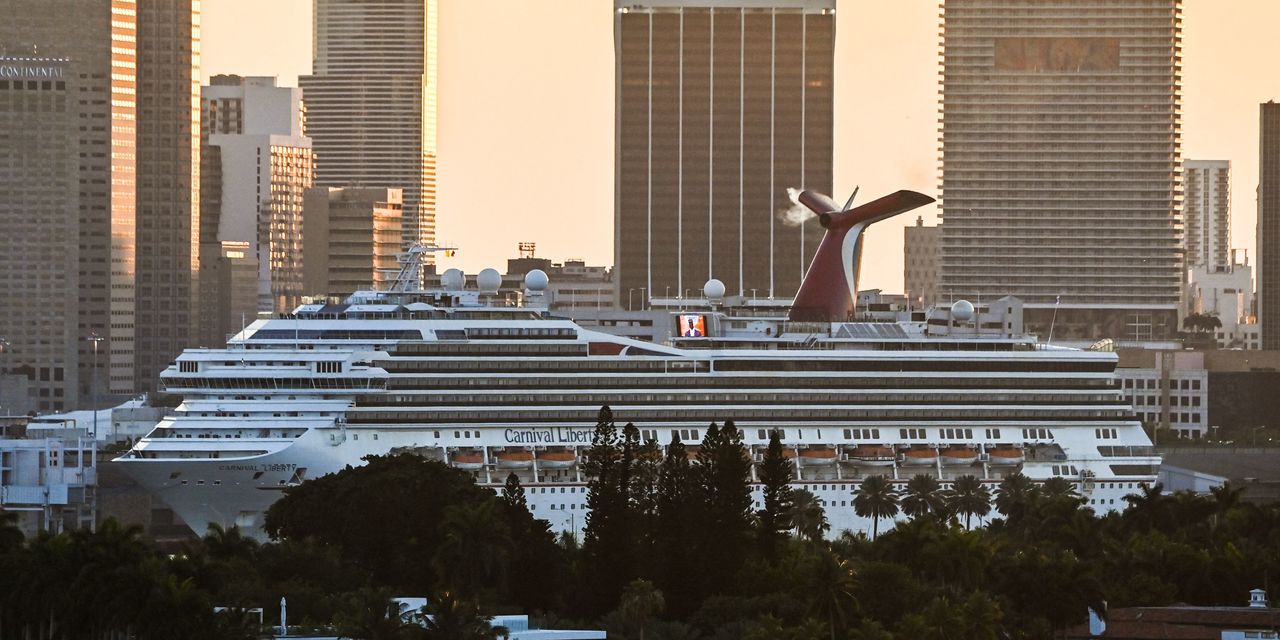Despite a blunt recommendation from Centers for Disease Control and Prevention to avoid cruise travel, the industry is sailing on for now as it tries to recover from the pandemic.
The same holds true for the cruise operators’ stocks, which slid in the last few days of 2021 but still held up relatively well in the second half of December.
“Investors are completely taking this in stride,” Chris Woronka, an analyst at Deutsche Bank who covers the cruise lines and other travel sectors, told Barron’s on Saturday.
But it hasn’t been smooth sailing, and plenty of hurdles remain.
On Dec. 30, the CDC raised its Covid-19 travel health notice from 3 to 4, the highest level, for cruise travel. The agency urged travelers to avoid cruises “regardless of vaccination status.”
As of Saturday afternoon, there were no reports of any cruise voyage cancellations, though the Omicron variant is believed to have forced the cruise operators to review their itineraries, including which ports they call on.
Cruise company
Royal Caribbean Group (ticker: RCL) said in a press release Thursday that the company “is experiencing service disruptions at selected destinations” and that it had “canceled or significantly modified 16 destination calls out of 331.”
Patrick Scholes, a travel and leisure analyst at Truist Securities, points out that the CDC’s action comes at an especially bad time for the cruise operators.
“It’s a very inopportune time to have that happen because we are going into the big selling season,” says Scholes. “It’s going to hurt, the degree of which we don’t know yet. But there’s absolutely nothing good coming out of that announcement” by the CDC.
Still, Woronka says that enthusiasm for cruising remains strong among travelers. The largest bucket of cruise customers, he says, “are going to go” on sailings.
For now, investors are taking the CDC’s recommendation in stride, though the stock prices declined in the last few trading days of 2021.
For example, shares of
Carnival (CCL), the largest cruise company, fell by about 5% from Dec. 23 through Dec. 31, compared with a gain of nearly 1% for the S&P 500. From Dec. 17 through Dec. 31, though, the stock gained 10%, easily beating the S&P 500’s 3% result.
“The market is saying that these disruptions are not going to cripple the cruise companies,” Woronka says. “They’ve got pretty sufficient liquidity buffers to get through this. The view is that the CDC does not derail the second half of ’22 and ‘23 recovery.”
Royal Caribbean said in its release Thursday that “none of the Omicron cases [aboard its ships] have been severe” or required hospitalization.
It added that “almost everyone onboard” its ships have been vaccinated. The company, which resumed U.S. sailings in June, said it has carried 1.1 million guests on its ships since then, with 1,475 people testing positive—a rate of 0.02%.
Carnival and its peers had been shut down from sailing in and out of U.S. ports for about 15 months starting in March 2020 due to the pandemic.
Royal Caribbean’s load factors, essentially bookings, for sailings in the first half of this year are below historical levels but are within their historical ranges for the second half of 2022, the company said.
Woronka has Hold ratings on Royal Caribbean, Carnival and
Norwegian Cruise Line Holdings (NCLH).
The stocks of all three companies have sold off by more than 10% since early November.
“Clearly, the market is still a little bit skittish about how this plays out,” says Woronka. “The base case is that we have a strong recovery in the back half of ’22 and into ’23, but there is risk. We didn’t see Omicron coming. It just popped up one day, and now it’s here.”
Royal Caribbean said in its release that the travel industry has been “experiencing significant disruptions by air transport and other service providers due to the spread of Omicron.”
As of mid-Saturday afternoon, there were about 2,500 flight cancellations within, into or out of the U.S., according to FlightAware. A day earlier, on Dec. 31, those cancellations totaled 1,625.
Delta Air Lines (DAL), for example, has attributed its flight cancellations to winter weather and the Omicron variant.
Write to Lawrence C. Strauss at lawrence.strauss@barrons.com
